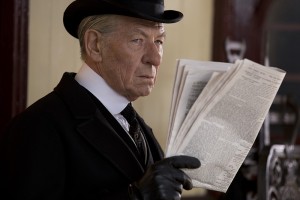Mr. Holmes
Mr. Holmes, 2015, 3 ¾ stars
The climactic case
Mr. Holmes imagines Sherlock’s final mystery
From The Orlando Weekly, July 15, 2015
Few fictional characters have captivated us as much as Sherlock Holmes. Few feel as real, as evidenced by the disturbingly large number of people who actually believe he is real. Perhaps that helps explain the instant affection one feels for director Bill Condon’s Mr. Holmes, a touching, dramatic imagining of the final, feeble days of the super sleuth.
The year is 1947, and the 93-year-old Holmes – played to perfection by Ian McKellen – has been retired in southern England for 30 years. Watson is either estranged or dead, and Sherlock’s brother, Mycroft, has just passed away. The great detective is all alone, save his housekeeper and her young son. As if the isolation and physical decay weren’t enough for this once-grand man, he’s suffering a loss that for the average man would be a tragedy but for him is the worst of indignations. He’s losing his memory.
In this reimagined post-war England – created by novelist Mitch Cullin and adapted by Jeffrey Hatcher – John Watson, not Arthur Conan Doyle, created the Holmes we know from the stories. He based these “penny dreadfuls with an elevated prose style” on the real-life cases, but he embellished them, providing added theatricality. Holmes was initially fine with that, but as he grows more and more frail, he longs to put down on paper the true story of his final case, the one that prompted him to retire. Yet, tragically, he can’t remember it.
Mr. Holmes is a moving and delightful look at a character we mistakenly though we already knew. Through the use of flashbacks and a stellar portrayal by McKellen – look for an Oscar nomination – we discover a more human Holmes, one full of both pride and regret, one struggling to balance his longing for logic with the realization that happiness may actually lie in an illogical sense of compassion.
Laura Linney, as the housekeeper, has to do some heavy lifting. Almost always up to that task in prior films, she’s an odd choice for this one, partially because she can never quite perfect the Sussex sound. Much is also asked of young Milo Parker, who plays the housekeeper’s son, and while he, like Linney, has some moments of real emotion, he too slips in and out of dialect.
Nevertheless, it’s fascinating to watch the relationship among the three characters slowly evolve. That evolution ultimately reveals new insights into Holmes’ personality, crime-solving skills and – most intriguingly – his past, which is kept shrouded from both his view and ours until the final act, in keeping with the best of the original Doyle stories.
The only questionable addition involves a trip to Japan in search of a natural memory enhancer. It adds little meaning to the narrative and creates a lot of structural baggage. Still, it does deepen the meta-theatrical discussion over how people perceive the “real” Holmes.
“One shouldn’t leave this life without a sense of completion,” says Sherlock. Thanks to this film, the character of Sherlock Holmes does indeed feel just a tad more complete.
© 2015 Orlando Weekly / MeierMovies, LLC
